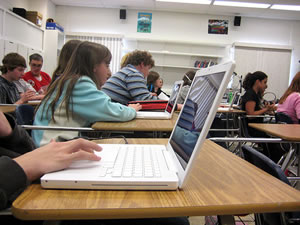
Part of providing a 21st-century education means incorporating digital resources into the classroom, but not every school has the knowledge or necessary to implement education technology successfully. To help remedy this situation, former Republican Gov. Jeb Bush of Florida and former Democratic Gov. Bob Wise of West Virginia have put their party differences aside to head a new Digital Learning Council that will create implementation guidelines for states and schools.
According to Bush and Wise, technological innovations have already changed the way the nation works, shops, and entertains itself. The Digital Learning Council aims to help transform education by moving digital learning to the forefront of education and away from the niche role it plays today.
“Today, more than two million students take courses online and 1.5 million home education students take online courses, but that barely scratches the surface of what is possible through technology,” said a statement from the nonprofit Alliance for Excellent Education (AEE), of which Wise is president.
“The members of the Digital Learning Council share a sense of extreme urgency about the need to bring digital learning to every school, every classroom, and every child,” said Wise, co-chair of the new organization, in a statement. “We must not squander the opportunity to promote digital innovation to reform our nation’s schools and ensure that all students are prepared to confront the challenges in our economy and society with the tools and skills that digital technology offers.”
The council, which has more than 50 members who are leaders in education, government, technology, think tanks, business, and philanthropy, will address all facets of digital learning, including:
- Online and virtual schools
- Personalized learning
- Blended learning
- Digital content
- Online and mobile social networks
- Classroom technology
- Ensuring equity, security, and privacy
- Promoting parental choice
“Digital learning expands access to a [high-] quality education,” Bush said in an interview with eSchool News.
“Right now, there is a child somewhere in the nation [who] has a dream of becoming a forensic scientist. Unfortunately for that student, [his or her] high school, whether in a rural community or the inner city, may not offer courses in that particular field of study. Digital learning solves that problem. An online course can be accessed from anywhere there is a computer and internet access. Increased access just scratches the surface. Technology can do for education what iTunes did for the music industry. The potential exists for teachers to select the best chapters from different textbooks to really customize lesson plans, and teachers can even tailor schoolwork to the interests of each one of their students.”
The final recommendations of the Digital Learning Council will be the focus of a nationwide campaign to urge adoption of the policy principles by states, track states’ progress, and encourage best practices.
Bush said that recommendations are scheduled to be released at the Excellence in Action National Summit on Education Reform 2010 in Washington, D.C., Nov. 30 to Dec. 1.
“Technology has the power to customize education for every student in America,” Bush added. “Providing a customized, personalized education for students was a dream just a decade ago. Technology can turn that dream into reality today. The Digital Learning Council will develop the roadmap to achieve that goal.”
Link:
Alliance for Excellent Education
Note to readers:
Don’t forget to visit the Online Learning: One Pathway to Success resource center. A growing number of K-12 school systems are discovering the power of online learning to transform education as we know it, opening up nearly limitless possibilities for their students. Go to:
Online Learning: One Pathway to Success
- ‘Buyer’s remorse’ dogging Common Core rollout - October 30, 2014
- Calif. law targets social media monitoring of students - October 2, 2014
- Elementary world language instruction - September 25, 2014


Comments are closed.